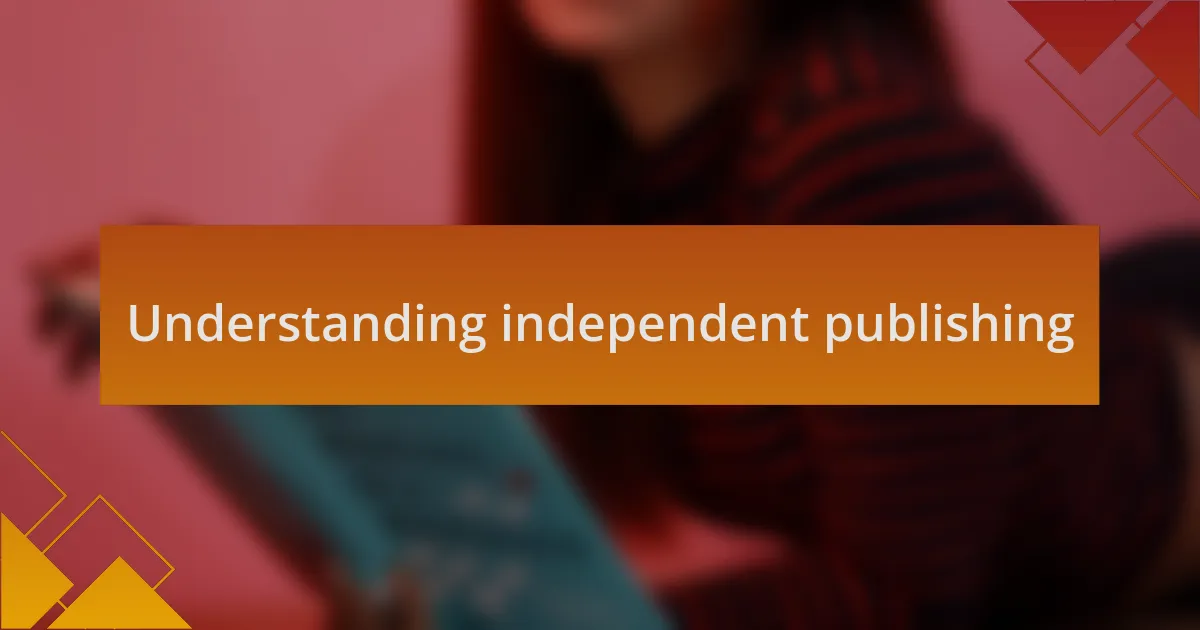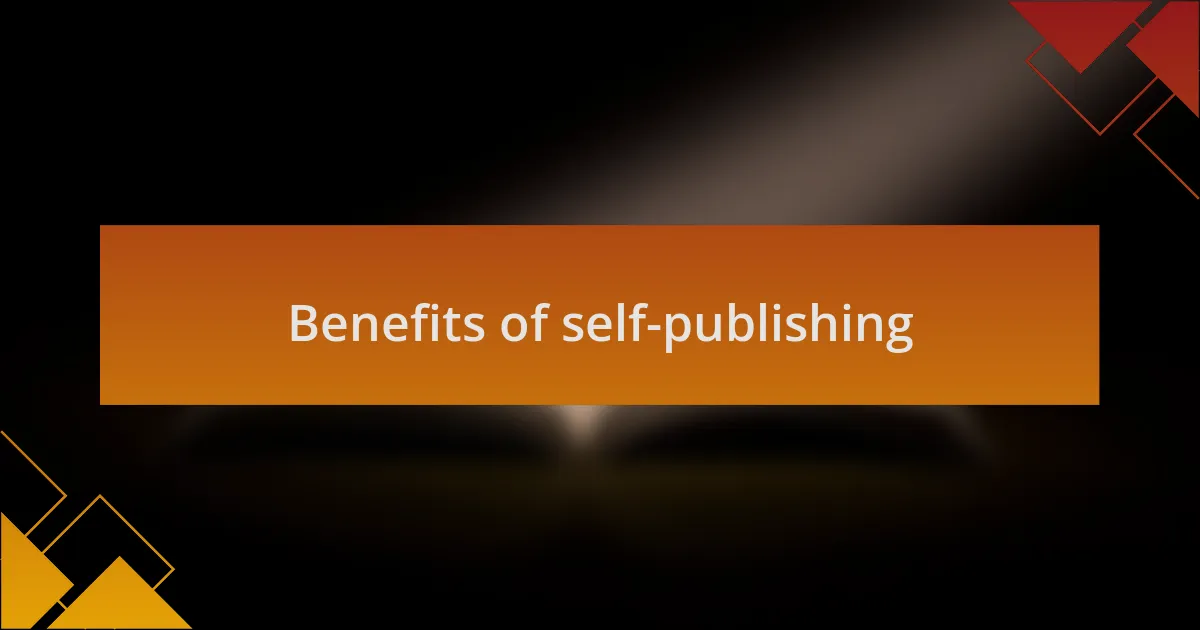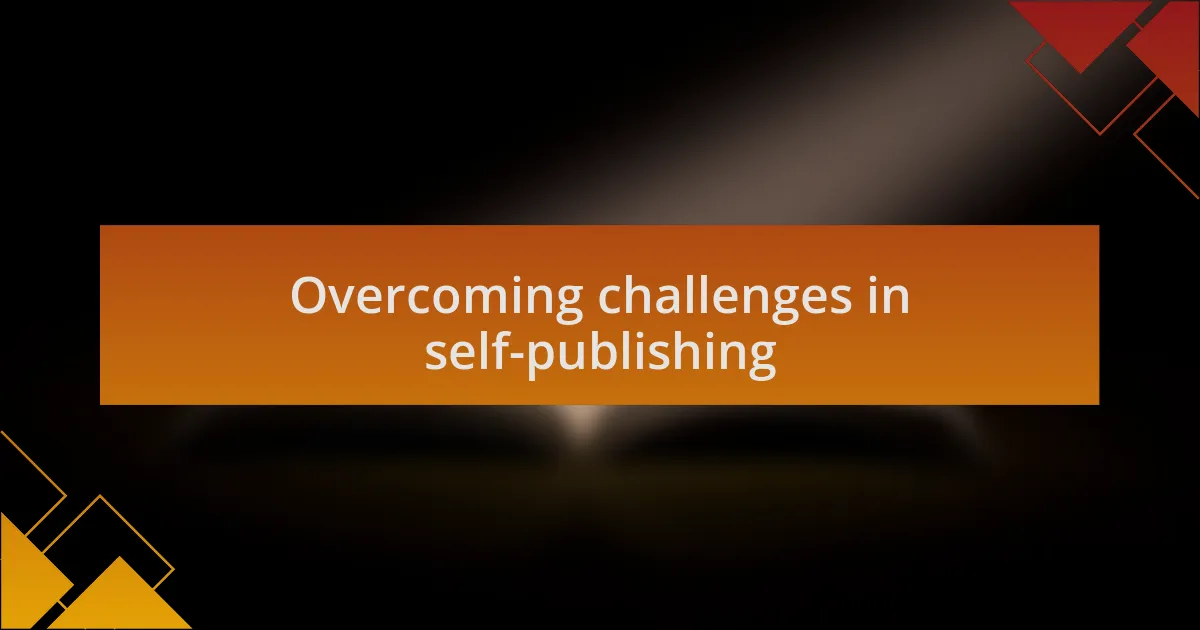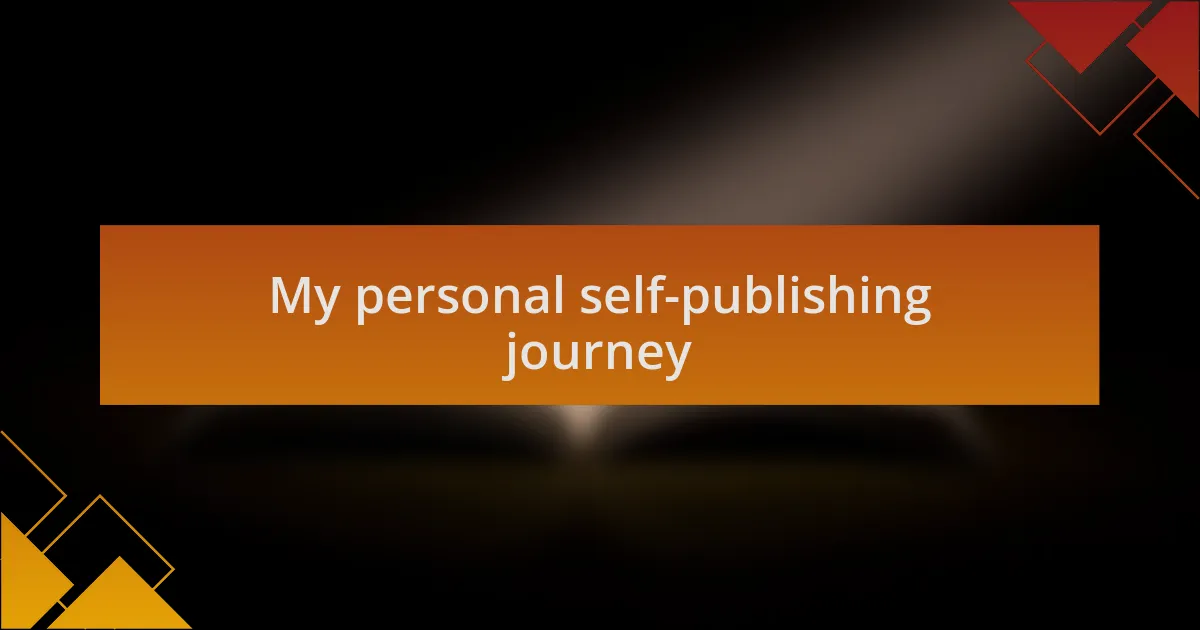Key takeaways:
- Independent publishing allows authors to maintain creative control and publish their work quickly compared to traditional routes.
- Engaging with readers through marketing strategies, such as social media and email marketing, fosters community and enhances the connection with the audience.
- Overcoming challenges like formatting and criticism is vital for growth; authors must balance creativity with business skills.
- Resilience and direct engagement with readers can transform setbacks into learning experiences, aiding in personal and professional development.

Understanding independent publishing
Independent publishing is an exciting frontier for writers who crave creative control. When I first ventured into this space, it felt liberating to know I could shape my narrative without the constraints of traditional publishing houses. Can you imagine the thrill of being your own publisher, deciding everything from cover design to marketing strategies?
Navigating this landscape can be overwhelming at times, especially with the plethora of platforms available. I remember scrolling through options like Amazon KDP, Smashwords, and others, feeling a mix of excitement and anxiety. Have you ever felt that moment of panic when faced with too many choices? It’s normal, but each platform offers unique opportunities to reach your audience.
Understanding independent publishing also means embracing the learning curve. My initial efforts had their fair share of missteps, but each mistake helped me grow. I found that engaging with readers and building a community around my work was just as valuable as the writing itself. What has your experience been in finding your audience? It’s a journey worth taking, filled with growth and discovery.

Benefits of self-publishing
One of the most significant benefits of self-publishing is the immediate control it grants over the entire process. I vividly remember the first time I hit “publish” on my manuscript; it was a blend of fear and exhilaration. Suddenly, I was the one deciding how my book would look and feel, from the cover to the formatting. Isn’t it empowering to know that your vision can be realized exactly as you imagine it?
Another advantage lies in the speed of the publishing process. Unlike traditional routes, where timelines can stretch into years, I was able to release my work within months. The thrill of seeing my book available online so quickly was addictive. Have you ever been eager to share something you’ve created? With self-publishing, that eagerness can be fulfilled almost instantly, allowing you to connect with readers without delay.
Self-publishing also fosters a direct relationship with your audience. I distinctly recall receiving feedback from readers soon after my release; it felt like having conversations rather than just transactions. This connection is priceless. Do you see value in understanding exactly what resonates with your readers? The insights I gained helped me improve my writing and build a loyal following, something I never anticipated when I first embarked on my journey.

Marketing strategies for self-published authors
Marketing your self-published book is crucial for reaching your audience effectively. I remember the moment I started leveraging social media platforms; it transformed my engagement with readers. By sharing behind-the-scenes content and snippets from my writing, I created a sense of community around my work. Isn’t it invigorating to see fans and followers rally around your creative journey?
Email marketing has been a game-changer for me. Building a mailing list allowed me not only to share updates but also to foster relationships with my readers. I’ve found that when I write personal messages or exclusive content, the response is overwhelmingly positive. Have you ever been excited to receive a note from an author you admire? That personal touch can make a significant difference.
Another strategy that worked wonders is collaborating with other authors in similar genres. When I participated in joint promotions or virtual events, I was introduced to a new audience who was already interested in what I had to offer. It’s like having a friend recommend your work; there’s built-in trust and curiosity. Isn’t it fascinating how sharing connections can amplify your reach in the self-publishing world?

Overcoming challenges in self-publishing
Navigating the world of self-publishing comes with its fair share of obstacles. I distinctly remember grappling with the daunting task of formatting my manuscript. It felt like decoding a foreign language, with every tool and guide leading me down another rabbit hole. Have you ever been so close to your work that the simplest tasks feel insurmountable? I learned that seeking help from professional services, or even tech-savvy friends, can make all the difference.
Then there’s the overwhelming challenge of balancing creativity with business acumen. I once found myself so engrossed in writing that I neglected crucial marketing planning until it was almost too late. It’s a common pitfall among self-published authors. I realized that scheduling regular blocks of time for planning promotional activities could alleviate that stress and ensure I was positioned for success when my book launched. Do you struggle to juggle the creative and the commercial aspects of your work? You’re not alone; finding that harmony is part of the journey.
Lastly, handling criticism can be especially tough. The first negative review I read felt like a personal attack, almost crippling my motivation. Over time, I learned to view feedback, even the harsh kind, as an opportunity for growth. It’s about developing a thicker skin and understanding that every reader’s perspective is just one piece of the larger puzzle. How do you cope with criticism? I’ve come to embrace it as part of the tapestry of self-publishing that shapes my artistry.

My personal self-publishing journey
The turning point in my self-publishing journey came when I decided to share my manuscript with a trusted friend. Their enthusiasm and constructive feedback reignited my passion. Have you ever felt uncertain about your work until someone else provided that much-needed validation? That moment taught me the power of community and support.
As I ventured into the world of self-publishing, I encountered a whirlwind of emotions, from elation at completing my draft to the anxiety of putting it out into the world. I still remember my heart racing as I hit the “publish” button for the first time. That rush of vulnerability is something every author experiences, and I realized that embracing it was essential for personal growth.
The journey wasn’t just about the finished book; it was also about discovering my voice and style. I experimented with different genres and formats, often feeling lost along the way. If you’ve ever tried something completely new, you know that uncertainty can be both thrilling and terrifying. Yet, those moments of exploration ultimately shaped me as a writer, reinforcing my belief that every stumble is part of the path to success.

Lessons learned from my experience
One of the most significant lessons I’ve learned is the importance of resilience. Early on, I faced numerous rejections from literary agents that left me questioning my talent. I had to remind myself, “What can I learn from this experience?” Instead of succumbing to self-doubt, I used each rejection as a stepping stone. This shift in mindset not only bolstered my resolve but ultimately led me to discover the self-publishing route, which felt far more aligned with my vision as an author.
Another revelation came when I began to engage with my readers directly. I was surprised by how much feedback they offered through social media and book reviews. Their insights were enlightening! I remember reading one comment that challenged my perspective and made me rethink a character arc. This interaction reminded me that my work is not just for me; it’s a shared experience. Connecting with readers has enriched my writing and has provided insight into what resonates with them.
Lastly, I’ve learned that marketing is as crucial as the writing itself. Initially, I felt overwhelmed by the idea of promoting my work, but I soon realized that my story deserved to be heard. I took smaller steps, such as hosting local readings or collaborating with bloggers. Each effort, no matter how minor, contributed to a growing audience. Have you ever hesitated to promote your work? I think we often underestimate the impact of our voices in the broader conversation, and I encourage every budding author to embrace marketing as part of their creative journey.